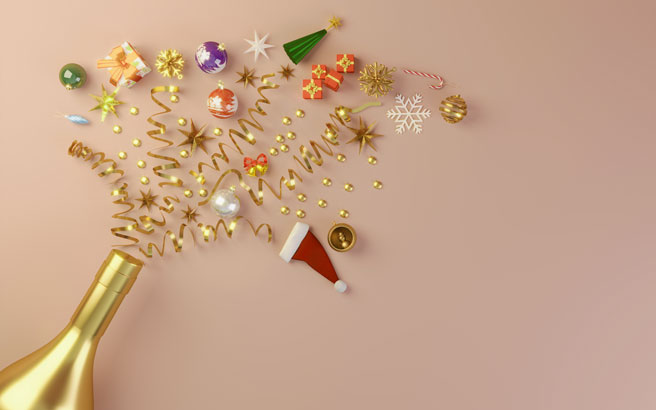For many of us, Christmas and the festive season are synonymous with alcohol, whether it’s a whisky tumbler, a glass of red wine or the seasonal eggnog.
So when I was asked to write a blog about avoiding alcohol at Christmas, I was a little stumped. While it can be a difficult subject to talk about, we can’t shy away from the fact that alcohol is unhealthy for us. Bah humbug!
Alcohol deaths rise
New ONS stats have just come out showing that deaths from alcohol in the UK have risen to their highest level since records began in 2001. There are many health risks associated with alcohol – and no safe level of consumption. World Cancer Research Fund’s own evidence shows that it increases your risk of at least 6 cancers, including breast and bowel, even if you stay within the recommended guidelines of no more than 14 units per week.
So is there an easy way to reduce the amount of alcohol we drink, especially on boozy occasions such as Christmas?
Around 40% of people in the UK do not know that drinking alcohol increases the risk of cancer. Part of World Cancer Research Fund’s role is to increase that awareness and equip people with the facts – so that we can all make informed decisions.
We’re told to drink up

However, it’s not that simple. Many of our unhealthy habits are shaped by practices used by industry to encourage us to consume more, whether we’re talking about alcohol, cigarettes or junk food. Industry uses powerful tactics to influence our choices – in this case what, when and how much alcohol we drink.
One such tactic is advertising, which businesses use to normalise alcohol consumption. Next time you watch a football match and have the urge to get a cold beer from the fridge, look at whether the advertising boards or half-time adverts are plastered with beer brands – or even sponsoring the tournament. Have you been subconsciously influenced?
And it doesn’t stop there. Images equating alcohol and happiness are common – that happy Christmas family made complete with an alcoholic festive drink. Unfortunately, for many households, happiness and alcohol couldn’t be further from the truth.
In England, it’s possible to drink the recommended weekly maximum of 14 units for just £2.68 (pdf) – less than the cost of a large coffee in many high-street chains. The cheaper alcohol becomes, the more alcohol is consumed – with increased alcohol-related harm.
Our charity has a role to play in increasing public awareness of the health risks of alcohol consumption, but there is also a need for government action. We urge the UK government to develop a new alcohol strategy, which should include:
- Better labels on alcoholic drinks, with prominent health warnings.
- Taxes and pricing policies, such as a minimum price per unit, to deter people from drinking.
- Tighter regulation of where, when and how alcohol is marketed.
These measures would help create a healthier environment for us to all live in, and minimise the harms caused by alcohol.
 It’s important we keep the pressure on the government on alcohol. In the meantime, we can help you take control of how much alcohol you drink – starting this Christmas. Our health experts have some great tips, including:
It’s important we keep the pressure on the government on alcohol. In the meantime, we can help you take control of how much alcohol you drink – starting this Christmas. Our health experts have some great tips, including:
- choose a spritzer over a glass of wine
- have some alcohol-free days
- choose small glasses eg 125ml of wine or half-pints
- have plenty of water between alcoholic drinks
- avoid salty snacks
- if entertaining at home, try our tasty mocktails
- check how many calories you consume through alcohol
Let us know how you get on, and we wish you all a very happy Christmas.
Drinkline is the national alcohol helpline in the UK. If you’re worried about your own or someone else’s drinking, you can call this free helpline in complete confidence. Call 0300 123 1110 (weekdays 9am to 8pm, weekends 11am to 4pm).


 Despite what industry adverts want you to think, alcohol spreads more harm than happiness, writes PR specialist Mélanie Marks Purnode.
Despite what industry adverts want you to think, alcohol spreads more harm than happiness, writes PR specialist Mélanie Marks Purnode.